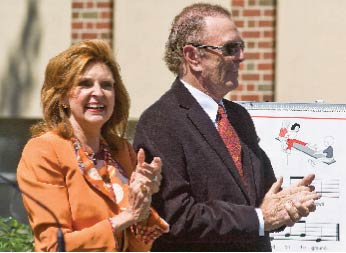UM Foundation
Building A Better Education
Phyllis and Dennis Washington celebrate along with more than 500 guests at the May 2 groundbreaking ceremony for the Phyllis J. Washington Education Center, scheduled to open in fall 2009.
In the Seventies computers became commonplace in many elementary and secondary schools, ushering in a new era of technology in the classroom.
The new technology helped capture the attention of students who learn in nontraditional ways, prepared future employees for a life in the modern workplace, and provided a new way to learn and teach.
Research continues to confirm the benefits of using technology in elementary and secondary schools. UM’s School of Education is at the forefront of this trend.
On May 2, the School of Education began construction of the Phyllis J. Washington Education Center—a 29,000-square-foot facility that will adjoin the existing Education Building and offer the most advanced technology available to help teachers do their jobs better.
Construction of the new education center was made possible through generous private support including a $10 million gift—the largest in UM history—from the Dennis and Phyllis Washington Foundation.
“The Phyllis J. Washington Education Center will play a critical role in our efforts to implement systemwide changes in education throughout Montana,” says Roberta D. Evans, dean of the School of Education. “The center’s focus is on early childhood education, math and science instruction, and distance learning, which are all priorities for Montana’s schools.”
Much has transpired in education since Phyllis Washington graduated from UM in 1964 and began teaching at a Missoula elementary school. Today’s educators are confronted with an increasing array of media and ever-advancing methods of teaching in the Information Age.
“Today the learning process takes advantage of electronic and digital media so teachers must have a command of always-changing technology to support new curricula,” Phyllis Washington says. “The Phyllis J. Washington Education Center will meet that need and surpass it with the programs it enables, putting Montana on the national stage, attracting the best and brightest to the School of Education and enhancing The University of Montana’s reputation for excellence.”
Teachers earning their degrees at the new Phyllis J. Washington Education Center will use interactive electronic whiteboards, or “smart boards.” Students will become familiar with creating instructional materials using video and computer equipment in multimedia production studios. Learning laboratories will allow teachers, students, and parents to observe student teaching in action.
Martin Horejsi, assistant professor in the school’s Department of Curriculum and Instruction, specializes in technology use in the classroom and believes the new center will create a unique, collaborative environment that will stimulate innovation and creativity in teaching and learning.
“As our students gain confidence using instructional technologies, they will employ critical thinking and problem-solving skills—two proficiencies essential to Twenty-First Century teachers and administrators,” Horejsi says.
The center also will develop programs to benefit Montana communities in areas such as educating children with disabilities and offering early intervention services and parenting classes.
And the facility, with its emphasis on distance learning, will help Montanans—especially those in rural areas—achieve their full academic potential.
Having a technological link from UM to school districts across the state is a valuable professional development resource for practicing educators.
“Educators everywhere are eager for The University of Montana to open this fabulous new facility,” Evans says. “It will be a model training facility where professional development opportunities and partnerships with educators across the state, throughout the country, and around the planet will thrive.”
The center, scheduled to open fall 2009, will allow the education school to expand its national and international influence and truly become a center for global education.
A campaign to complete funding of the center is under way, and many room-naming opportunities are still available. To learn more about ways to contribute, call Mark Armstrong of the UM Foundation at 406-243-4568 or
e-mail Mark.Armstrong@mso.umt.edu.
– Mark Armstrong